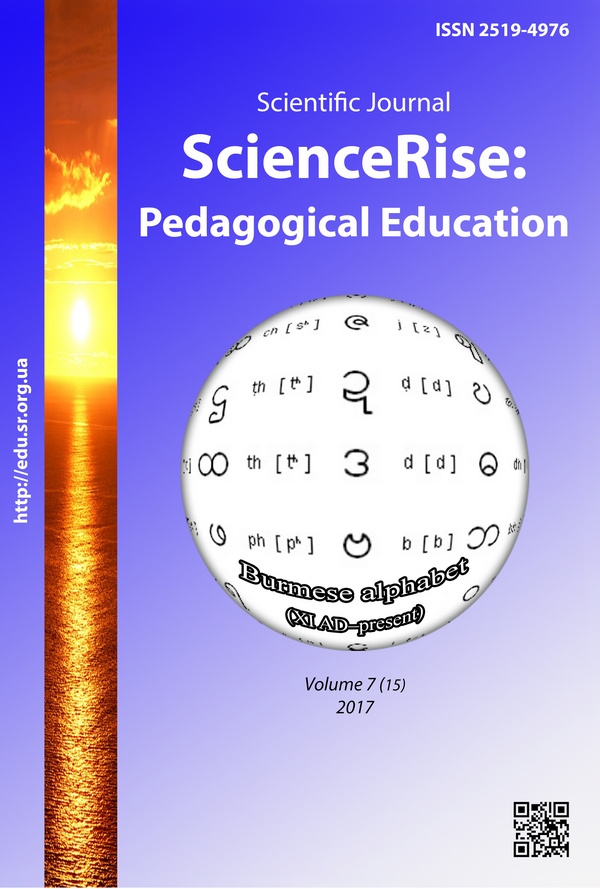Formation of skills of writer’s worldview and image recreation at studying his biography
DOI:
https://doi.org/10.15587/2519-4984.2017.107980Keywords:
training of students, skills biography of a writer, values, worldview, image, portrait, axiosphereAbstract
A writer’s biography is a component of each literature lesson. A teacher must be able to elucidate a writer as a person.
Scientists-methodologists permanently accent the importance of searching for artist’s views, work with a portrait, but don’t give any step-by-step prompt for creating an integral writer’s image.
The aim of the research: to outline base knowledge and logic of formation in future teachers of the one of most important special methodological skills of a literature teacher – creation of a writer’s worldview and image.
The skill of a writer’s worldview and image recreation is provided by the cognitive, praxeological and axiological components of students’ training. At lectures students master base knowledge about a portrait, its types, worldview, values, human axiosphere. Praxeological training is a work on a portrait, independent revelation of writer’s worldview values by students, combination with values of the epoch and national culture, construction of a writer’s image in its connection with the aim of a lesson and program work. Methodical support of the training is a scheme of a work on a portrait, table “Portrait types” and “dominating values of epochs and their characteristics in the aspect of human values”, figure “Personal values in the system of socio-cultural connections”, algorithm of the revelation of a writer’s life concept and plan of its image construction. A teacher of the methodology demonstrated samples of a work on a writer’s portrait and image, that contained facts of civic and creative activity of an artist, his aphorism, citations from art and epistolary works, to students. In such a way there were visibly connected a personal and creative portrait of a writer, his worldview and problems of a writing, was formed the understanding of ways of inclusion of a biography in the structure of a literature lessons by students.
The result of the research: base theoretical knowledge (portrait and its types, worldview, values, human axiosphere) were defined, logical way of a writer’s image modeling was demonstrated
References
- Metodyka prepodavanyya lyteraturi v sovetskoy shkole (1969). Khrestomatyya. Moscow: Prosveshhenye, 375.
- Ghladyshev,V. V. (1995). Vykorystannya avtobioghrafichnykh materialiv u procesi vyvchennya zhyttya i tvorchosti pysymennyka v kursi zarubizhnoyi literatury (XI klas). Kyiv, 23.
- Bondarenko, Yu. (2009). Filosofsyko-istorychni pidkhody do vyvchennya bioghrafiyi pysymennyka. Vsesvitnya literatura ta kulytura v navchalynykh zakladakh Ukrayiny, 4, 5–7.
- Miroshnychenko, L. F. (2007). Metodyka vykladannya svitovoyi lteratury v serednikh navchalynykh zakladakh. Kyiv: Vyshha shkola, 415.
- Ostrovska, G. O. (2015). Orghanizaciya navchalynogho procesu z formuvannya ghotovnosti maybutnikh uchyteliv literatury do vyvchennya bioghrafiyi pysymennyka. Science and Education a New Dimension: Pedagogy and Psychology, 3 (43), 39–42.
- Ostrovska, G. O. (2013). Aktyvyzacyya poznavatelynoy deyatelynosty studentov pry yzuchenyy byoghrafyy pysatelya. Science and Education a New Dimension: Pedagogy and Psychology, 9, 102–105.
- Ostrovska, G. O.; Lapenok, M. Y., Avdeeva, Y. N. (2013). Teoretychne obgruntuvannya systemy pidghotovky maybutnikh pedaghoghiv do vyvchennya u shkoli bioghrafiyi pysymennyka. Teoryya y tekhnologhyya obuchenyya fylologhycheskym dyscyplynam v vuze y shkole. Belgorod-Sevastopol-Kharkiv: Vyd-vo Virovecy A. P. «Apostrof», 281–302.
- Ostrovska, G. O. (2016). Axiological component of teacher training (the teachers of literature in particular). Intercultural Communication: Pedagogical approach, 1 (1), 101–113. Avaliable at: http://interculturalwsge.com/opublikowane-numery/8
- Fylosofskyi encyklopedycheskyi slovar (2002). Moscow: YNFRA-M, 576.
- Maslova, V. A. (2007). Homo lingualis v kulture. Moscow: Ghnozys, 318.
- Sokhan, L. (1988). Kultura zhyzny lychnosty: problemi teorii y metodologhii socyalno-psykhologhycheskogho issledovaniya. Kyiv: Naukova dumka, 189.
- Vynoghradov, V. V. (1971). O teorii khudozhestvennoy rechi. Moscow: Visshaya shkola, 239.
- Vylichynskaya, T. F. (2013). Obraz avtora khudozhestvennogho teksta v paradyghme sovremennikh lynghvystycheskykh issledovanyi. Uchenie zapysky Tavrycheskogho nacyonalnogho unyversyteta im. V. Y. Vernadskogho. Seriya «Fylologhiya. Socyalnie kommunykacyi», 26 (1), 190–194.
- Ostrovska, G. O. (2014). Aksiosfera uroku literatury. Naukovyi oghlyad, 5 (6), 109–116.
Downloads
Published
How to Cite
Issue
Section
License
Copyright (c) 2017 Galina Ostrovska

This work is licensed under a Creative Commons Attribution 4.0 International License.
Our journal abides by the Creative Commons CC BY copyright rights and permissions for open access journals.
Authors, who are published in this journal, agree to the following conditions:
1. The authors reserve the right to authorship of the work and pass the first publication right of this work to the journal under the terms of a Creative Commons CC BY, which allows others to freely distribute the published research with the obligatory reference to the authors of the original work and the first publication of the work in this journal.
2. The authors have the right to conclude separate supplement agreements that relate to non-exclusive work distribution in the form in which it has been published by the journal (for example, to upload the work to the online storage of the journal or publish it as part of a monograph), provided that the reference to the first publication of the work in this journal is included.








